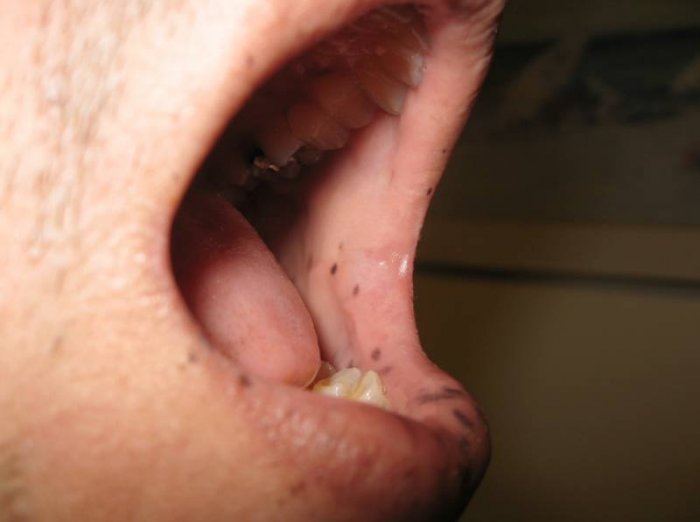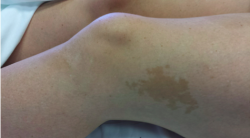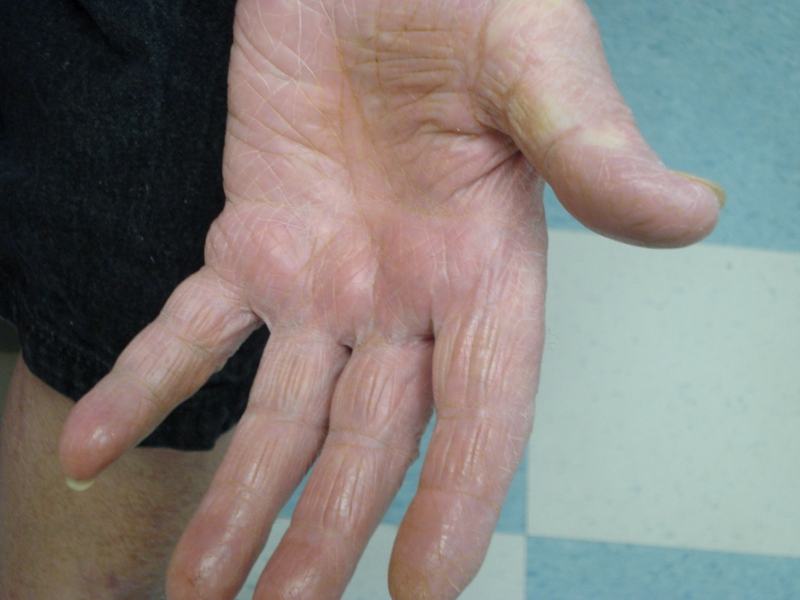CORRECT DIAGNOSIS:
Peutz-Jeghers Syndrome
DISCUSSION:
Peutz Jeghers Syndrome (PJS) is an uncommon disorder of pigmentation with associated visceral malignancies and gastrointestinal polyposis. PJS is inherited in an autosomal dominant fashion and characterized by the development of hamartomatous polyps in the gastrointestinal tract and hyperpigmented macules on the lips. Affected individuals are at increased risk of developing cancers of the pancreas, breast, ovaries, testes, and gastrointestinal tract.
PJS appears to be a result of a germline mutation of the STK11/LKB1 gene, a serine/threonine kinase and tumor suppressor gene, mapped to chromosome 19p13.3. Typical mucocutaneous lesions are present at birth or develop in infancy and are present in 95% of affected patients. Characteristic findings are small 1-5mm, dark brown, or black macules, usually located in the central face, perioral region, lips, and oral mucosa. Gastrointestinal polyps, usually found in the ileum and jejunum, present as characteristic hamartomas with histology exhibiting extensive smooth muscle arborization resulting in a 15-fold increased risk for developing gastrointestinal cancer compared with those of the general population. Patients undergo multiple surgeries and are at risk for postoperative complications. A combined endoscopic and laparoscopic approach can be used to treat proximal small bowel intussusception, noticeably reducing the need for repeated laparotomies.
Diagnostic criteria require at least two of the following: a family history of PJS, mucocutaneous lentiginosis, and gastrointestinal hamartomatous polyps. Genetic testing is available but the disorder can be diagnosed clinically by the aforementioned criteria alone.
TREATMENT:
The patient has regular annual follow up which includes intermittent endoscopic and colonoscopic evaluations for polyps as well as the development of potential visceral malignancies.
REFERENCES:
Boardman, L. A., Thibodeau, S. N., Schaid, D. J., et al. (1998). Increased risk for cancer in patients with the Peutz-Jeghers syndrome. Annals of Internal Medicine, 128(11), 896–899.
Boudeau, J., Sapkota, G., & Alessi, D. R. (2003). LKB1, a protein kinase regulating cell proliferation and polarity. FEBS Letters, 546, 159.
Brosens, L. A., van Hattem, W. A., Jansen, M., et al. (2007). Gastrointestinal polyposis syndromes. Current Molecular Medicine, 7(1), 29-46.
Davidson, N. O. (2007). Genetic testing in colorectal cancer: who, when, how and why. Keio Journal of Medicine, 56(1), 14-20.
Giardiello, F. M., Welsh, S. B., Hamilton, S. R., et al. (1987). Increased risk of cancer in the Peutz-Jeghers syndrome. New England Journal of Medicine, 316(24), 1511-1514.
Utsunomiya, J., Gocho, H., Miyanaga, T., et al. (1975). Peutz-Jeghers syndrome: Its natural course and management. Johns Hopkins Medical Journal, 136, 71.




